Posts in Category: Events
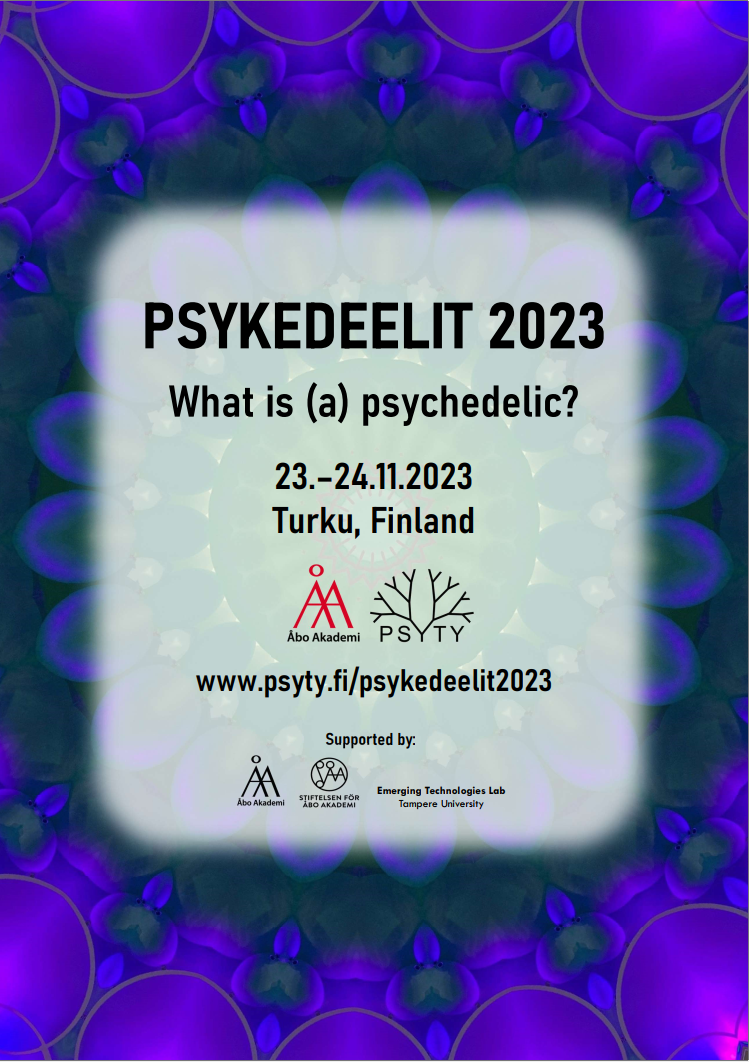
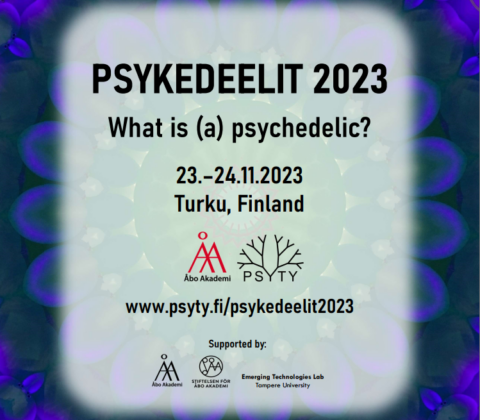
The 2nd Finnish Interdisciplinary Conference on Psychedelics in November
Psykedeelit 2023
The 2nd Finnish Interdisciplinary Conference on Psychedelics
What is (a) psychedelic?
November 23–24, 2023
Åbo Akademi University, Turku, Finland
In collaboration with Åbo Akademi University and the Emerging Technologies Lab of Tampere University, we are organizing Psykedeelit 2023 – The 2nd Finnish Interdisciplinary Conference on Psychedelics, in Turku, Finland, on November 23–24, 2023. This year’s conference focuses on the specific theme of What is (a) psychedelic?
Invited keynote speakers of the conference are psychologist Dr. Max Wolff (Charité – Berlin University of Medicine & MIND Foundation), who will talk about how psychedelic-assisted psychotherapy differs from ordinary psychotherapy, and evolutionary anthropologist Dr. Manvir Singh (Institute for Advanced Study, Toulouse), who will talk about psychedelics in relation to shamanism and indigenous cultures. In addition, we will hear over 25 other oral presentations on psychedelics and the psychedelic, by researchers from a variety of fields of science from Finland and abroad. Academic posters will also be presented.
Registration is now open! Proposals for academic posters may also still be submitted.
See https://psyty.fi/psykedeelit2023 for registration, details, and an updating program.
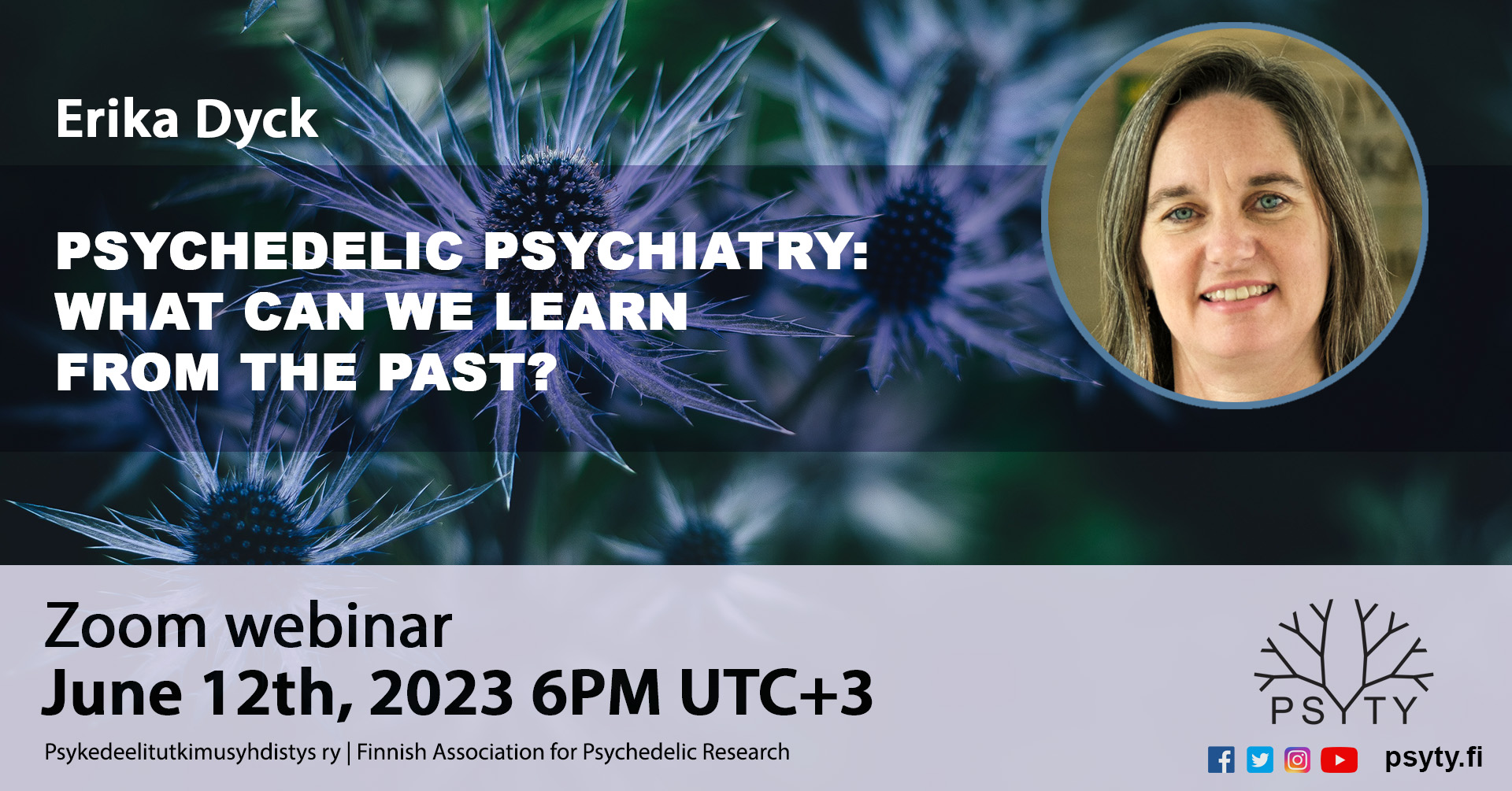
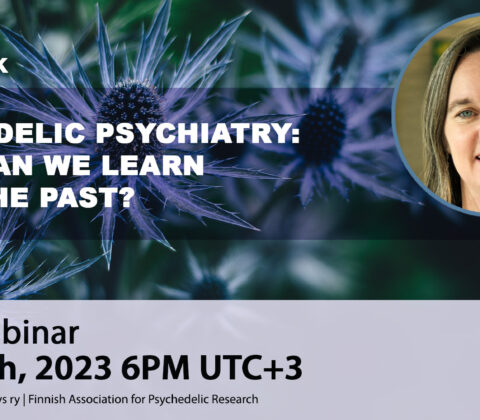
Webinar June 12th 2023. Erika Dyck – Psychedelic Psychiatry: What can we learn from the past?
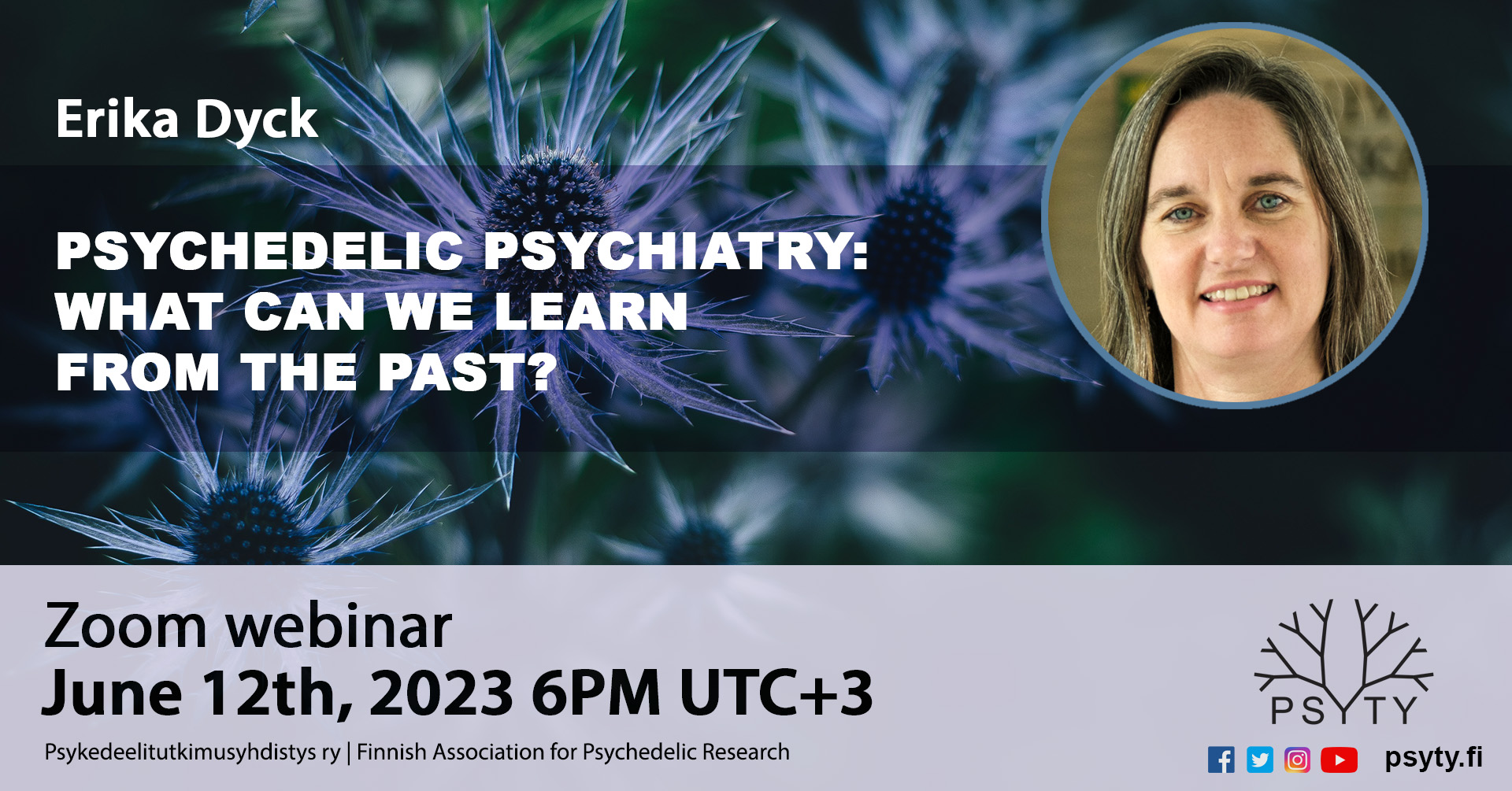
In 1956, psychiatrist Humphry Osmond first used the word ‘psychedelic’ to describe the feelings and sensations associated with LSD. The term, conceived during his correspondence with the literary genius Aldous Huxley, was soon added to the English lexicon. In spite of the popular connotations now connected to the word, Osmond developed the term out of his LSD experiments with colleagues at the University of Saskatchewan. The experiments led him to propose a new theory of schizophrenia alongside a somewhat radical suggestion to treat alcoholism using LSD. In contrast with many of his psychiatric contemporaries, Osmond and his colleagues maintained that pharmacotherapies flourished most when combined with tenets of empathy, deference, and even ritual – features he learned from Indigenous ceremonies with plant medicines.
Although Osmond was not alone among his colleagues in the 1950s fascinated with the medical applications of psychedelics, his work in Canada made him a major figure in the history of LSD and addiction research, but also an awkward character in a looming countercultural revolution. LSD was banned from use by the late 1960s for a combination of moral and scientific reasons, but new developments in the 21st century are encouraging policy makers and researchers to revisit these historical studies.
On Monday, June 12th at 6PM UTC+3, in a Zoom webinar presented by professor Erika Dyck from the University of Saskatchewan’s Department of History, we will dive into the history of psychedelics and consider what we might learn from the past as we entertain a psychedelic renaissance. What do we have yet to learn from Indigenous roots of psychedelic ceremonies, or from missteps of the past that might warrant a retrial? We will consider examples from the past and also look at how historical ideas have continued to influence the psychedelic movement today.
Tickets are available from our web store. For members of the association who’ve paid their membership fee for 2023, the event is free of charge. If you want to pay your membership fee for this year or become a member, you’ll find our membership products on the main page of our web store. An email with a link for free registration to the event has been sent to members of the association. If you’re not sure if you’ve paid for your membership this year, feel free to ask us.
Erika Dyck is a Professor and a Canada Research Chair in the History of Health & Social Justice at the University of Saskatchewan’s Department of History. Her interdisciplinary research brings social sciences and humanities perspectives to scientific and medical subjects. Her work has been published in medical, legal, economic, literary, philosophical, anthropological and historical venues. She is the author of several books, including: Psychedelic Psychiatry: LSD from Clinic to Campus (Johns Hopkins, 2008; University of Manitoba Press, 2011); Managing Madness: the Weyburn Mental Hospital and the Transformation of Psychiatric Care in Canada (University of Manitoba Press, 2017), which won the Canadian Historical Association Prize for best book in Prairie History; and The Acid Room: the psychedelic trials and tribulations of Hollywood Hospital (2022), nominated for Saskatchewan and BC book awards. She is also the co-editor of Psychedelic Prophets: The Letters of Aldous Huxley and Humphry Osmond (2018); and A Culture’s Catalyst: Historical Encounters with the Native American Church in Canada and Peyote (2016), and a forthcoming collection with Chris Elcock, Expanding Mindscapes: a global history of psychedelics (MIT Press 2023). She is the co-editor of the Canadian Journal of Health History (2015-present), the President of the [International] Alcohol and Drugs History Society; and co-editor of 2 international books series with McGill-Queen’s Press – History of Health and Medicine, and Intoxicating Histories.
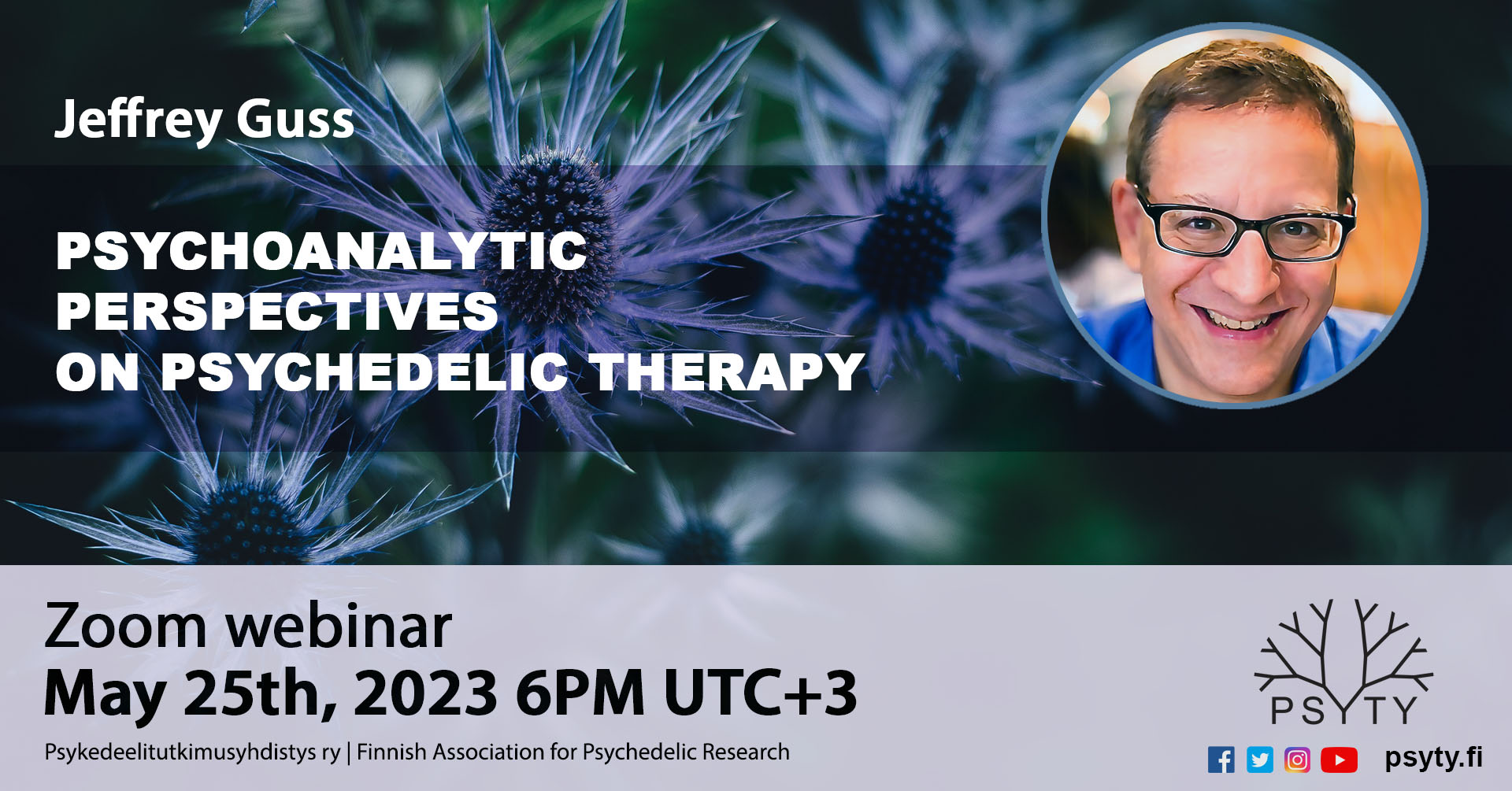
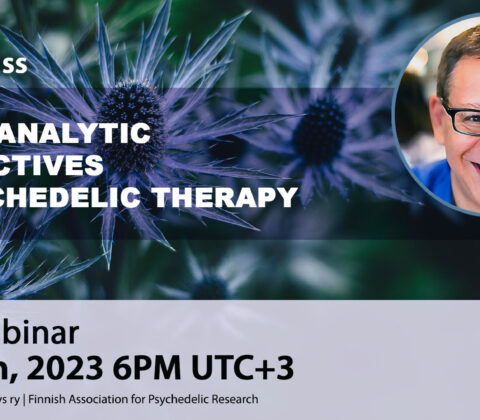
Webinar May 25th 2023. Jeffrey Guss: Psychoanalytic Perspectives on Psychedelic Therapy

What do psychedelics have to offer for dealing with existential crises? What are the correspondences between psychotherapy and shamanic healing? How can psychoanalytic perspectives enrich our understanding of psychedelics, and vice versa? We’ll be spending time with these questions on Thursday, May 25th at 6PM UTC+3 in a Zoom presentation by psychiatrist, psychoanalyst, researcher and teacher Jeffrey Guss, whose experience includes working with psilocybin in a study for patients suffering from existential anxiety related to life-threatening illness.
The presentation will begin with a description of psychedelic experiences that are not in the context of psychotherapy and describe correspondences between psychotherapy and shamanic healing. Guss will then discuss the core processes that may occur as part of psychedelic psychotherapy, describing psychedelic phenomeonlogy in psychoanalytic and neuropsychoanalytic terms. In the last part of his talk, he will offer a case presentation of a participant he worked with in the aforementioned study. Following the case presentation, he will integrate elements of this individual’s psilocybin journey with the core processes described at the beginning of the talk.
Tickets are available from our web store. For members of the association who’ve paid their membership fee for 2023, the event is free of charge. If you want to pay your membership fee for this year or become a member, you’ll find our membership products on the main page of our web store. An email with a link for free registration to the event has been sent to members of the association. If you’re not sure if you’ve paid for your membership this year, feel free to ask us.
Jeffrey Guss, MD is a psychiatrist, psychoanalyst, researcher, and teacher with specializations in psychoanalytic therapy and psychedelic therapy. He was Co-Principal Investigator and Director of Psychedelic Therapy Training for the NYU School of Medicine’s study on psilocybin-assisted psychotherapy in the treatment of cancer related existential distress. He is currently a Lead Trainer with Fluence, with a focus on the integration of psychedelic therapy with psychoanalysis. He is a study therapist in the NYU study on Psilocybin-Assisted treatment of Major Depressive Disorder. He has published on the integration of Acceptance and Commitment Therapy with psychedelic assisted therapy for MDD in Journal of Contextual and Behavioral Science and the influence of therapists’ first-hand experience with psychedelics on psychedelic-assisted psychotherapy research. He is an Instructor and Mentor with the California Institute of Integral Studies’ Center for Psychedelic Therapies and maintains a private practice in New York City.
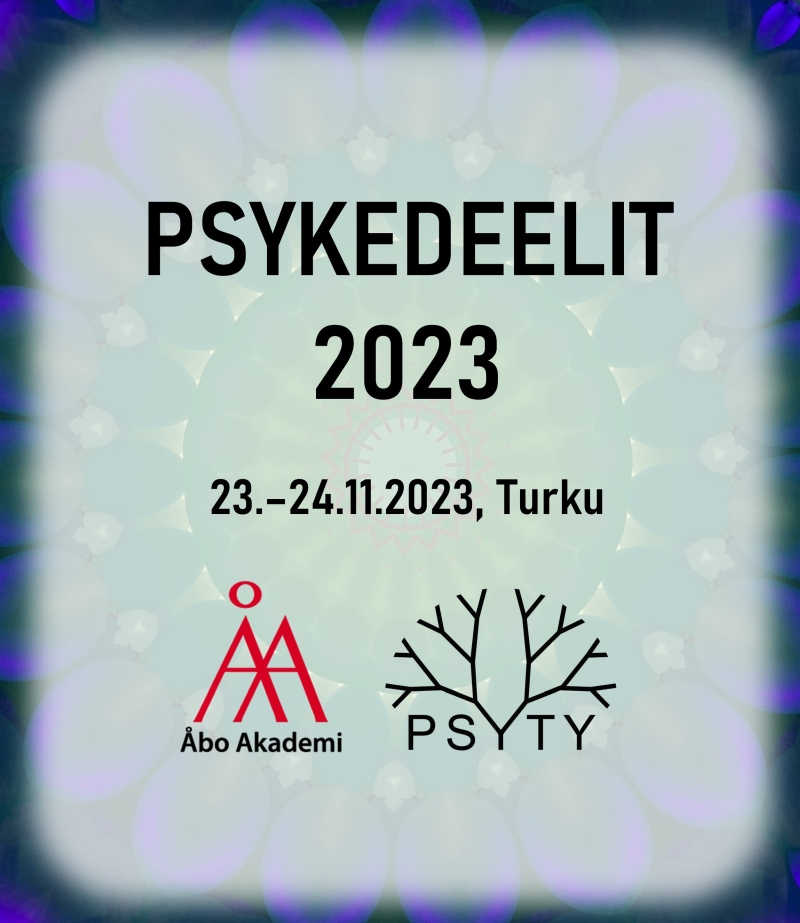
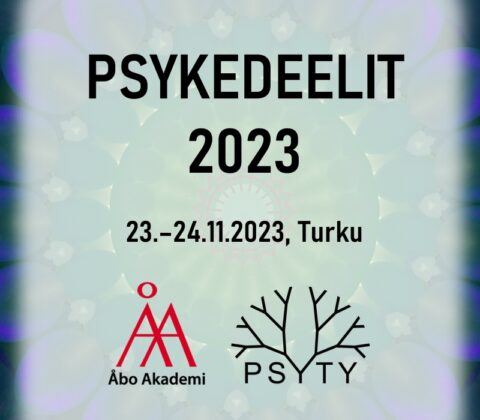
Psykedeelit 2023 – The 2nd Finnish Interdisciplinary Conference on Psychedelics

Psykedeelit 2023
The 2nd Finnish Interdisciplinary Conference on Psychedelics
What is (a) psychedelic?
November 23–24, 2023
Åbo Akademi University, Turku, Finland
In collaboration with Åbo Akademi University, we are organizing Psykedeelit 2023 – The 2nd Finnish Interdisciplinary Conference on Psychedelics, in Turku, Finland, on November 23–24, 2023. This year’s conference focuses on the specific theme of What is (a) psychedelic?
Invited keynote speakers of the conference are psychologist Dr. Max Wolff (Charité – Berlin University of Medicine & MIND Foundation), who will talk about how psychedelic-assisted psychotherapy differs from ordinary psychotherapy, and evolutionary anthropologist Dr. Manvir Singh (Institute for Advanced Study, Toulouse), who will talk about psychedelics in relation to shamanism and indigenous cultures.
The conference is multidisciplinary to the bone and open to researchers, students, and others whose work is related to psychedelics in any field of science (e.g., psychologists, physicians, pharmacologists, sociologists, philosophers, theologians, anthropologists, gender studies researchers, artists).
The Call for Proposals for talks and posters is open until May 31st, and registration is also now open.
See https://psyty.fi/psykedeelit2023 for details.
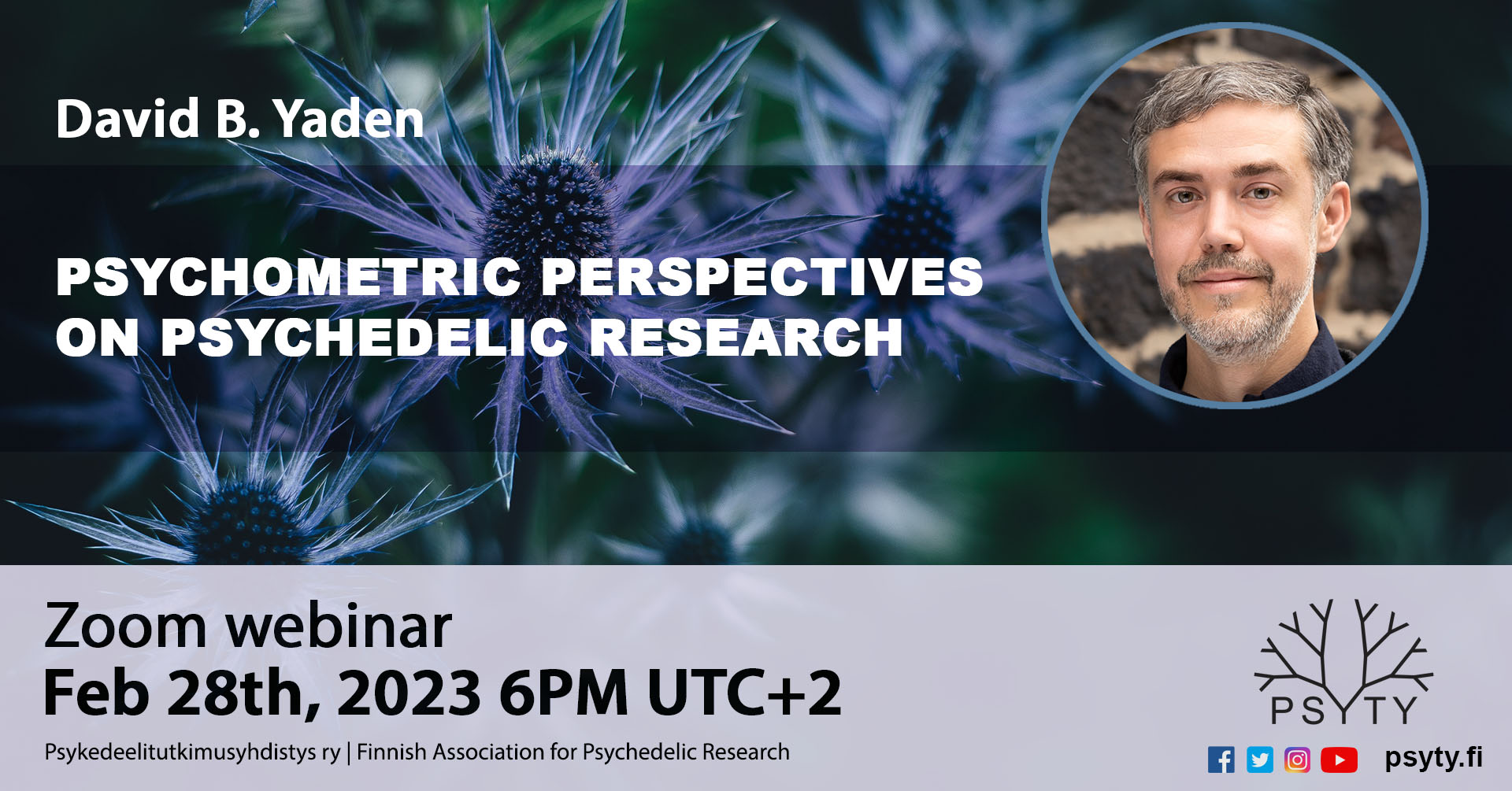
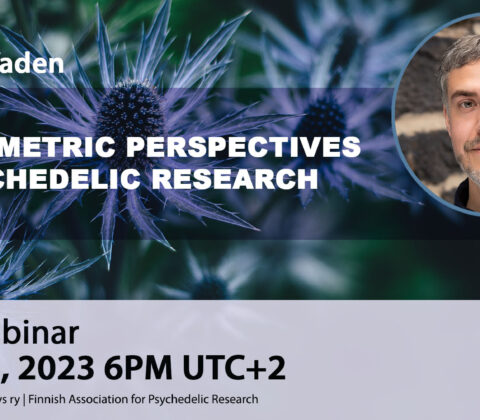
Webinar February 28th 2023. David B. Yaden: Psychometric Perspectives on Psychedelic Research
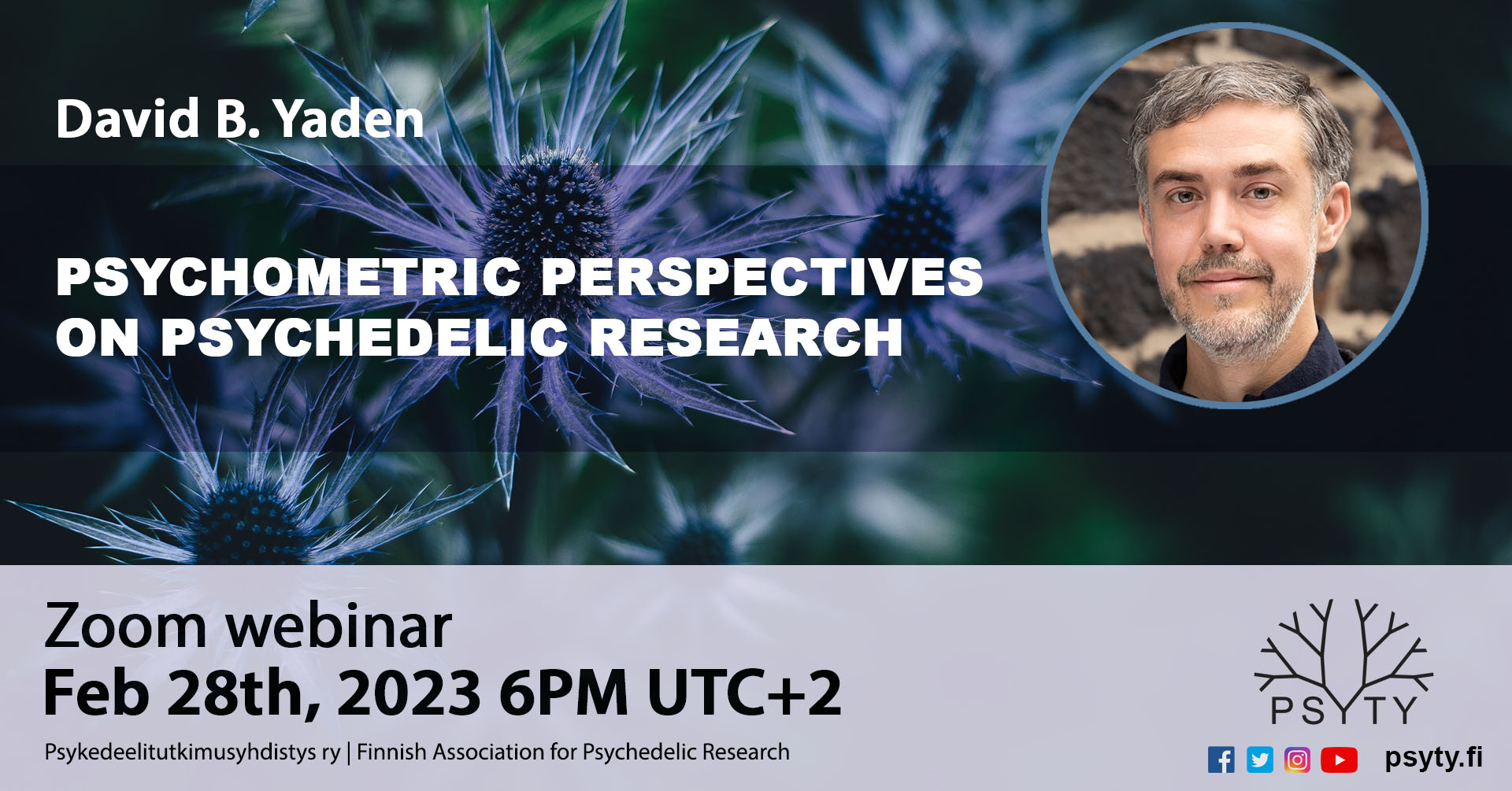
What is a psychedelic experience like? That is, what does it feel like and what other kinds of experiences are similar? And how can such a subjective event be measured? These are some of the questions studied by David B. Yaden, PhD, Assistant Professor at Johns Hopkins University School of Medicine working in The Center for Psychedelic and Consciousness Research.
Dr. Yaden is interested in understanding how brief experiences can result in long-term changes to well-being, and studies the subjective and behavioral effects of psychedelics and their treatment potential, the ethical issues involved, as well as consciousness, beliefs, religion and spirituality. His recent book with Andrew Newberg, The Varieties of Spiritual Experience, has received wide-ranging praise as an update and extension of William James’ 1902 classic, The Varieties of Religious Experience.
On Tuesday, February 28th at 6PM UTC+2, Dr. Yaden will give a Zoom presentation on the psychometric self-report measures that are currently used in psychedelic research, and discuss their limitations and ways to improve and standardize these measures.
Unlike usually, this webinar will not be recorded, so being there is the only way to hear it!
Tickets are available from our web store. For members of the association who’ve paid their membership fee for 2023, the event is free of charge. If you want to pay your membership fee for this year or become a member, you’ll find our membership products on the main page of our web store. An email with a link for free registration to the event has been sent to members of the association. If you’re not sure if you’ve paid for your membership this year, feel free to ask us.
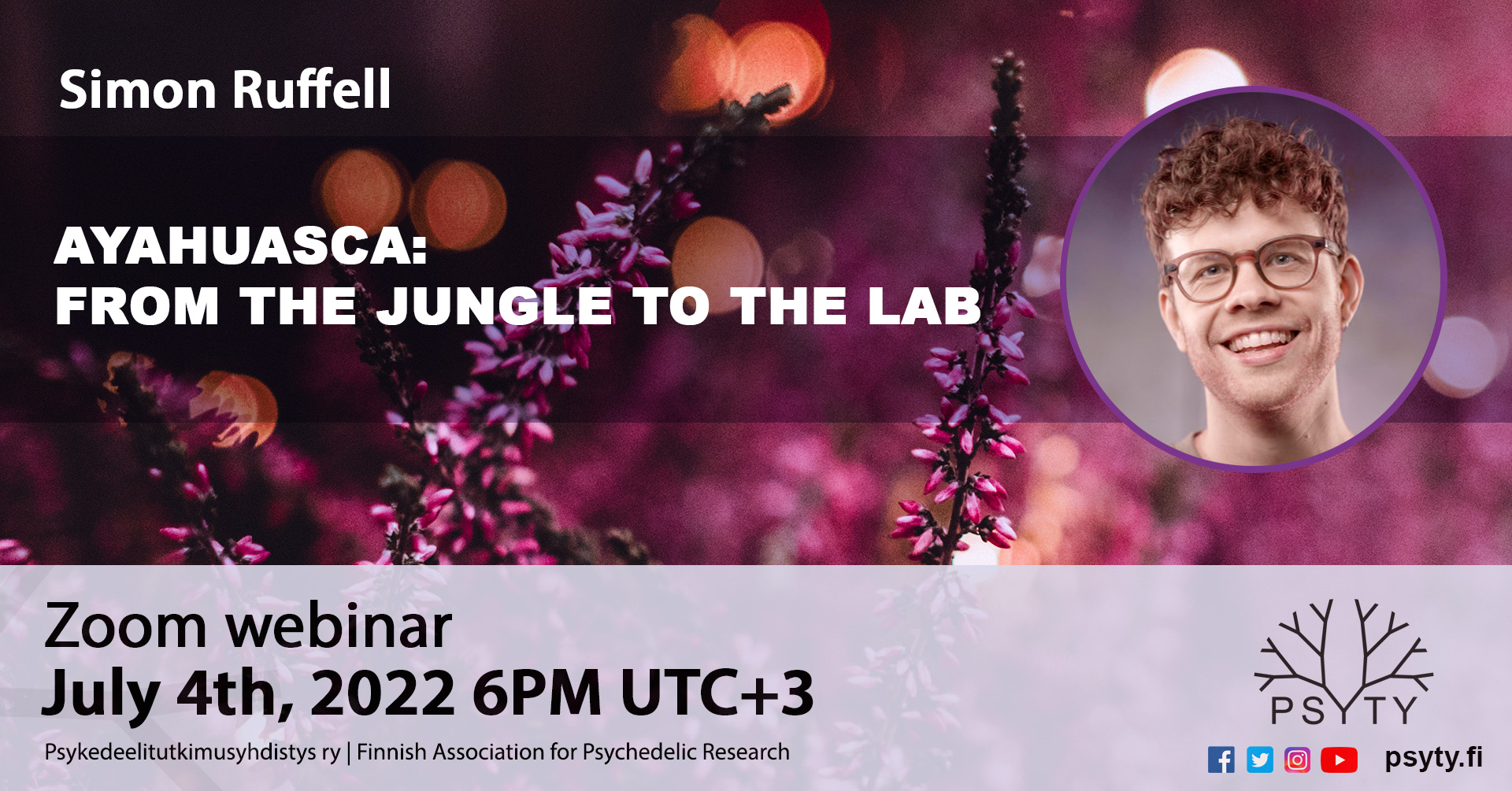
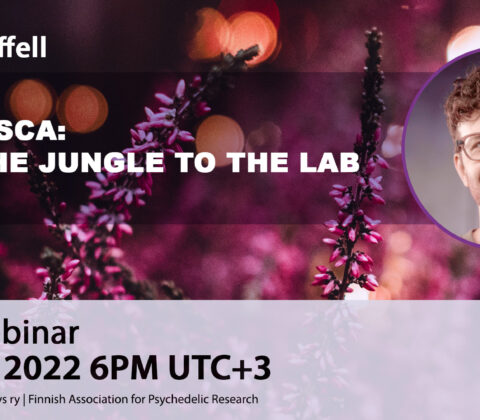
Webinar July 4th. Simon Ruffell – Ayahuasca: from the jungle to the lab
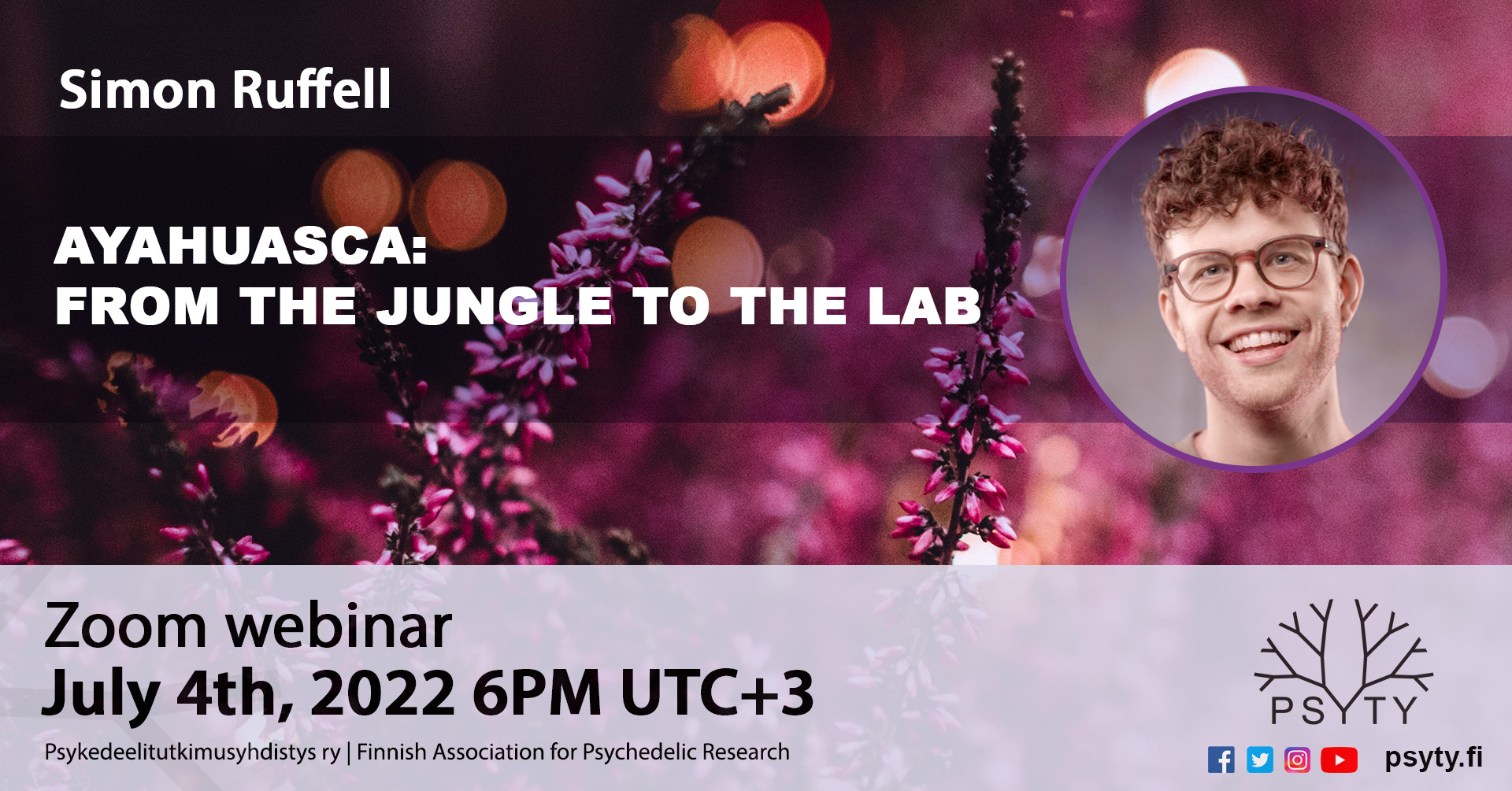
-> Buy ticket from our web store! <-
Ayahuasca is a psychoactive plant concoction that’s traditionally been used in Amazonian tribal rituals. Recently, research on its possible positive impacts on mental health has been gaining increasing attention. Use of the brew has been studied in both laboratory and traditional settings. Psychiatrist Simon Ruffell is one of the researchers currently investigating the brew. In addition to interesting results on mental health and wellbeing, his research team has been the first to study epigenetic effects correlated with psychedelic use.
On Monday, July 4th at 6PM UTC+3, Ruffell will talk about his research in a Zoom webinar organized by the Finnish Association for Psychedelic Research (Psykedeelitutkimusyhdistys ry). He will provide an overview of his research surrounding the ceremonial use of Amazonian ayahuasca and its effect on mental health outcomes, personality, epigenetics, and psychotherapeutic processes. Ruffell also introduces his current research conducting randomised controlled trials with the Psychae Institute into ayahuasca inspired concoctions and discusses the potential benefits and challenges associated with the use of plant medicines in a clinical setting.
Tickets are available in two categories: 10 € (full price) and 5 € (students / low income participants). You can buy a ticket in our web store.
For members of the association who’ve paid their membership fee for 2022, the event is free of charge. If you want to pay your membership fee for this year or become a member, you’ll find our membership products on the main page of our web store. An email with a link for free registration to the event has been sent to members of the association. If you’re not sure if you’ve paid for your membership this year, feel free to ask us.
About the speaker:
Simon Ruffell studied medicine at the University of Sheffield before specialising in psychiatry. He completed his core psychiatric training at The Maudsley Hospital in London and worked at King’s College London as a Senior Research Associate investigating the use of psilocybin for treatment resistant depression. Simon has a keen interest in transcultural psychiatry and has worked for a variety of charities overseas. Since 2016 he has conducted research into the traditional psychedelic brew ayahuasca and its effects on mental health based in the Peruvian Amazon and is currently completing his PhD in this based at Goldsmiths, University of London. In his spare time Simon volunteers for Psycare – a charity offering support to those undergoing challenging drug experiences at music festivals.
The Finnish Association for Psychedelic Research is a non-profit association promoting scientific research related to psychedelics and the availability of accessible information based on such research.
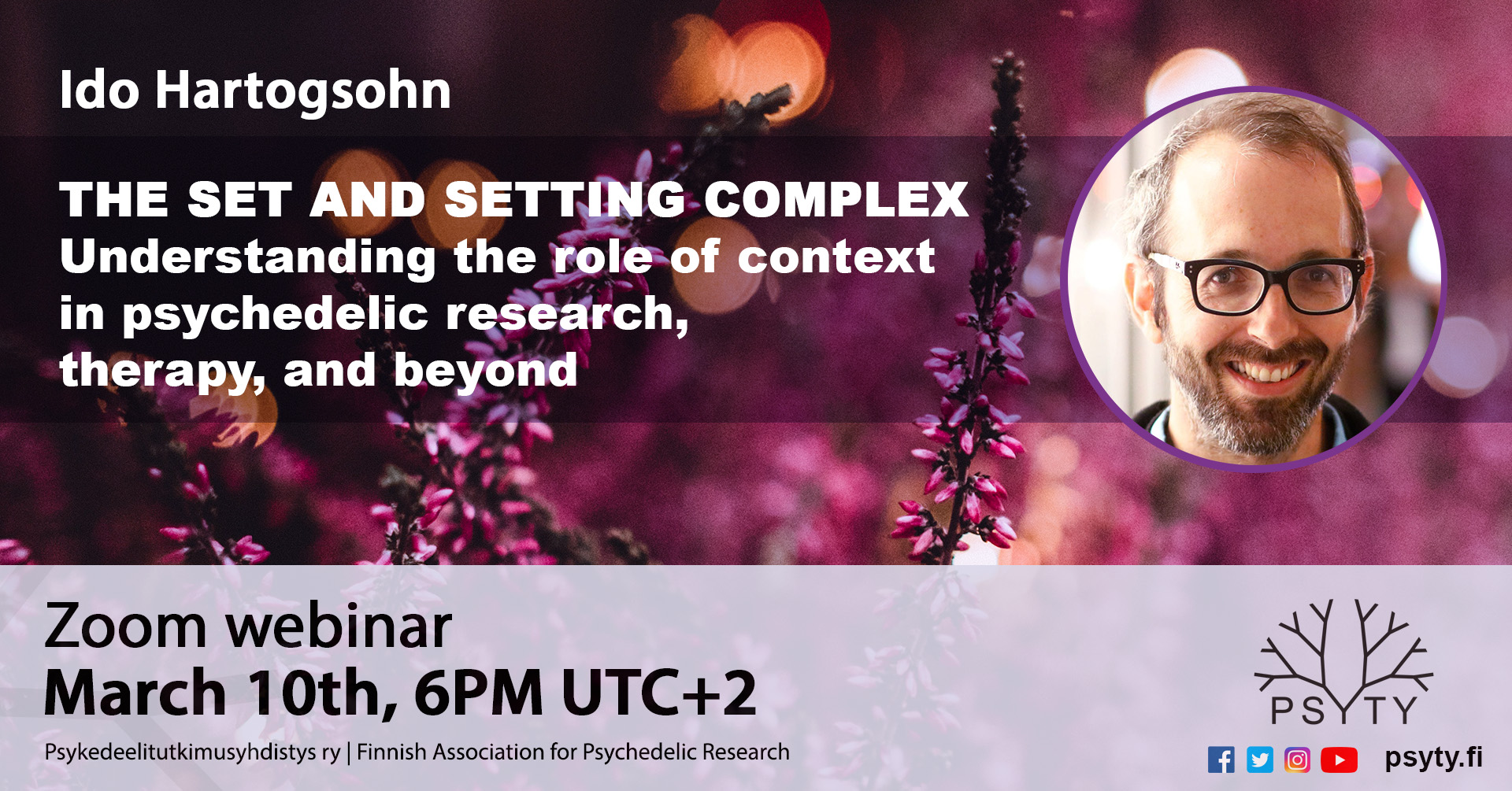
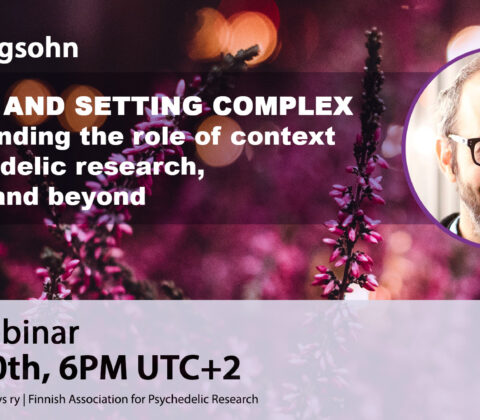
Webinar March 10th 2022. Ido Hartogsohn: The set and setting complex: Understanding the role of context in psychedelic research, therapy, and beyond

-> Buy ticket from our web shop! <-
The set and setting principle, which states that context shapes experiences with psychotropics, is the most central, recurring concept in psychedelic science and therapy. It is considered crucial to interpreting the results of psychedelic science, and to optimizing the outcomes of psychedelic therapy.
How does set and setting relate to psychedelic phenomenology? Why did it emerge specifically in the context of psychedelic science? And how is set and setting related to other fields of extra-pharmacological investigation like placebo science?
On Thursday, March 10th at 6PM UTC+2 / 6PM CET, scholar of psychedelic history and sociology, dr. Ido Hartogsohn will present a Zoom webinar on the evolution, evidence and implications of set and setting for research, therapy and beyond. The event is organized by the Finnish Association for Psychedelic Research. Tickets are available in two categories: 10 € (full price) and 5 € (students / low income participants). You can buy the ticket in our web store.
For members of the association who’ve paid their membership fee for 2022, the event is free of charge. If you want to pay your membership fee for this year or become a member, you’ll find our membership products on the main page of our web store. An email with a link for free registration to the event has been sent to members of the association. If you’re not sure if you’ve paid for your membership this year, feel free to ask us.
Ido Hartogson is an assistant professor at the Graduate Program for Science, Technology and Society, at Bar Ilan University. Hartogsohn’s work explores the subject of set and setting in psychedelic research and culture. His book American Trip: Set, Setting and the Psychedelic Experience in the Twentieth Century appeared with MIT Press (2020).
The Finnish Association for Psychedelic Research is a non-profit association promoting scientific research related to psychedelics and the availability of accessible information based on such research.
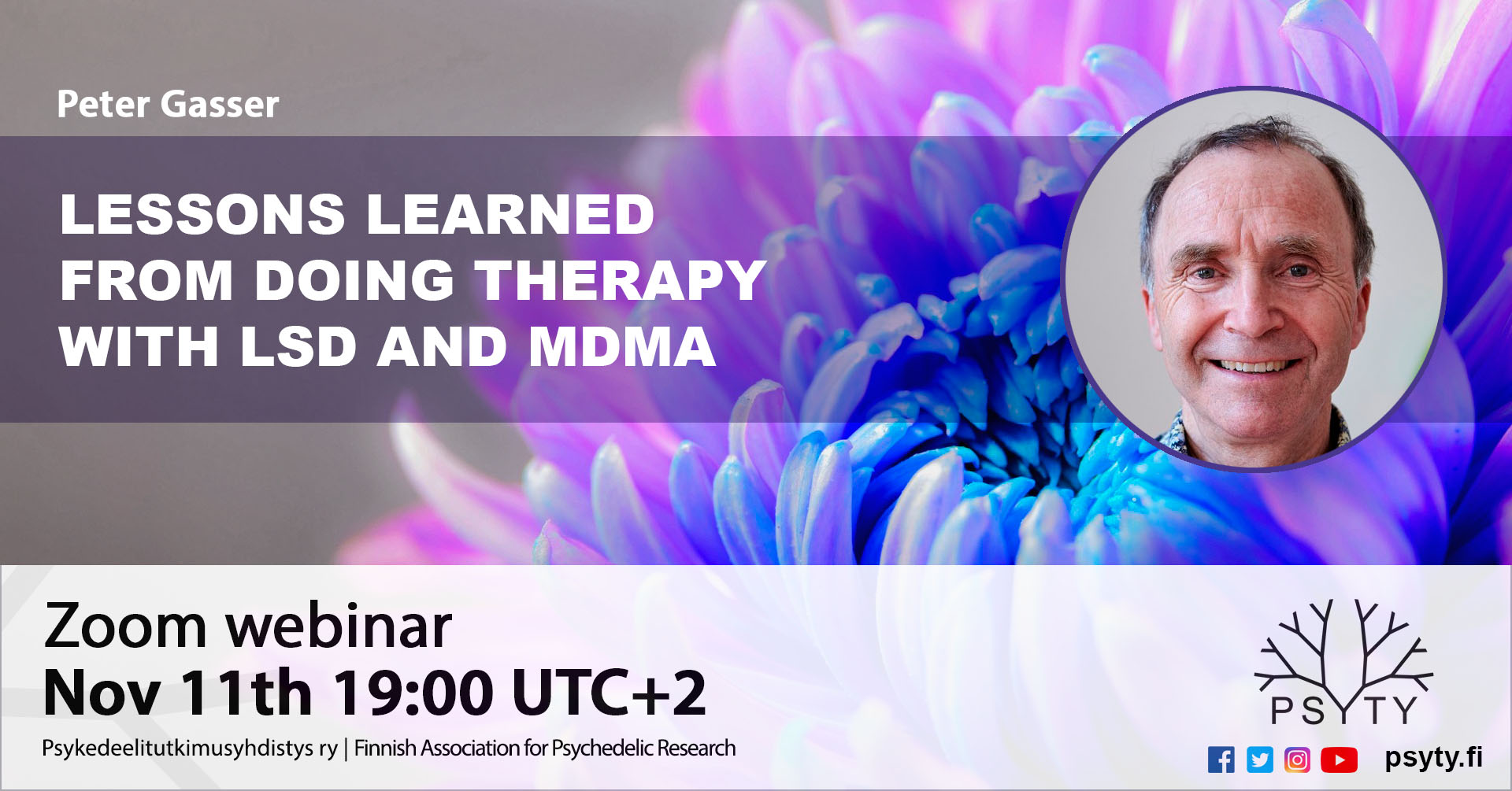
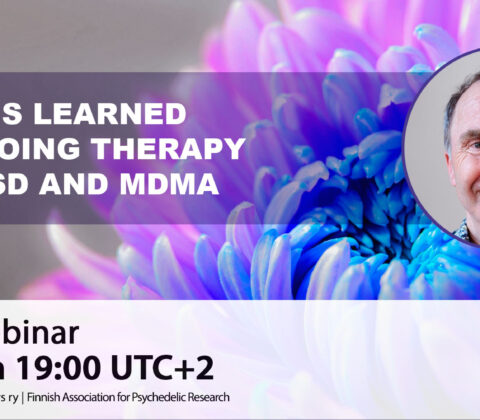
Webinar Nov 11th 2021. Peter Gasser: Lessons learned from doing therapy with LSD and MDMA
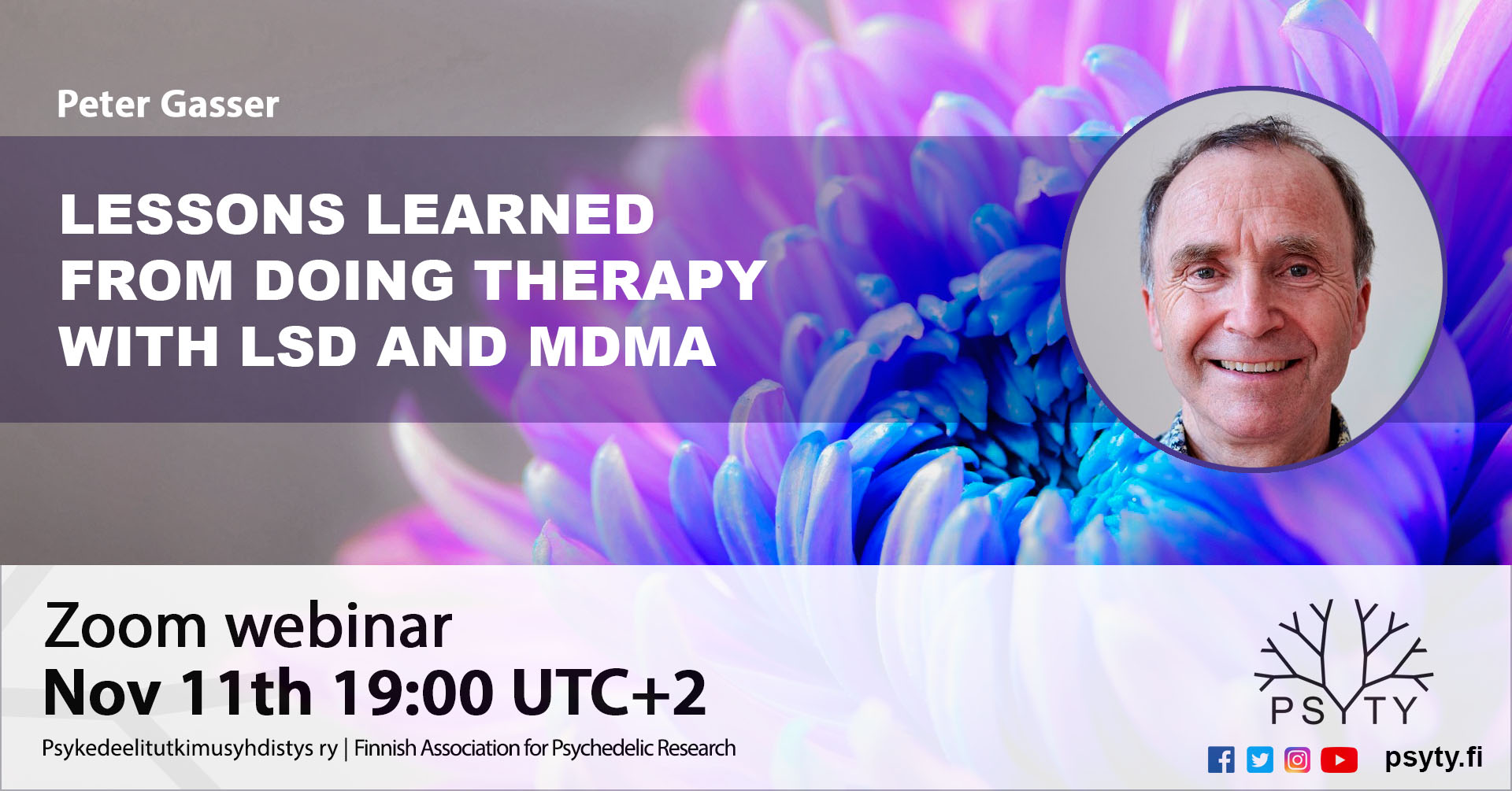
Legal psychedelic therapy is mostly available in research contexts. Switzerland is an exception to this rule: In addition to research projects, the country grants individual treatment permissions for psychedelic therapy. Psychiatrist and psychotherapist Peter Gasser has extensive experience with these forms of therapy: At the turn of the 90s, he had special permission from the Swiss Federal Office for Public Health to research LSD and MDMA. After 2007, he has conducted two studies for LSD-assisted therapy in patients with anxieties due to life-threatening diseases. Since 2014, he has held individual permissions by the Swiss Health Administration for therapy with mind altering substances, which currently also includes psilocybin.
On Thursday, November 11th at 7PM UTC+2 / 6PM CET, Dr. Gasser will be sharing some of his extensive experience in a Zoom webinar organized by the Finnish Association for Psychedelic Research. Drawing from his own clinical experience and from research projects around the world, Gasser will discuss the framework he uses and the conclusions that can currently be made.
Born in 1960, psychiatrist and psychotherapist Peter Gasser runs a private practice in Solothurn, Switzerland. He is a husband and a father of three. He was trained in psychodynamic methods as well as in therapy with mind altering drugs, i.e. psycholytic or psychedelic therapy. He has been a member of the Swiss Medical Society for Psycholytic Therapy since 1992 and its president since 1996.
The Finnish Association for Psychedelic Research is a non-profit association promoting scientific research related to psychedelics and the availability of accessible information based on such research.
Tickets are available in two categories: 10 € (full price) and 5 € (students / low income participants). You can buy the ticket in our web store.
For members of the association who’ve paid their membership fee for 2021, the event is free of charge. If you want to pay your membership fee for this year or become a member, you’ll find our membership items on the main page of our web store. An email with a link for free registration has been sent to members of the association. If you’re not sure if you’ve paid for your membership this year, feel free to ask us.
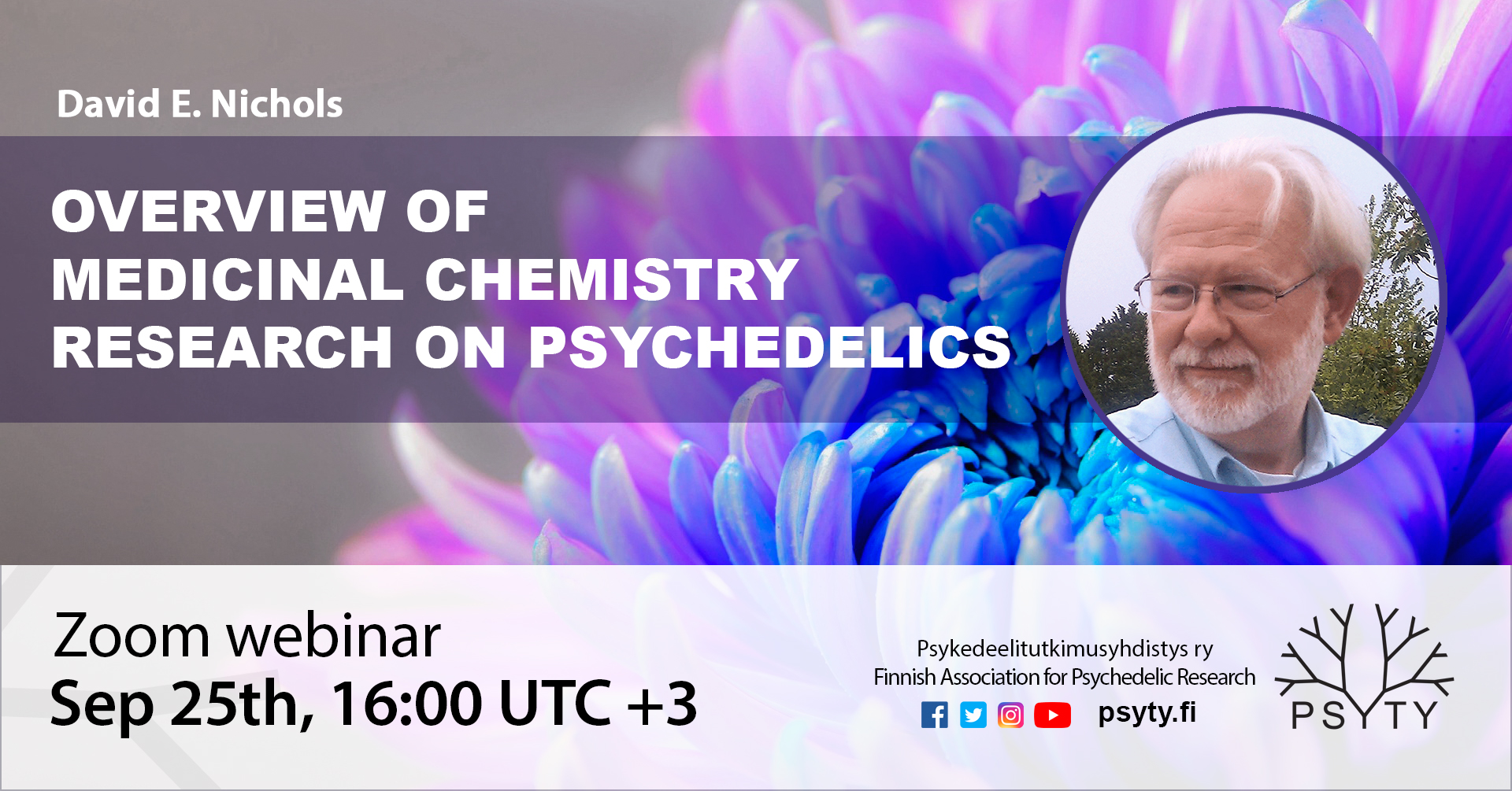
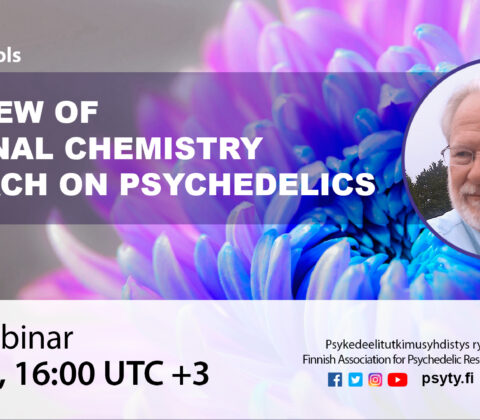
Zoom webinar Sept 25th 2021. David E. Nichols: Overview of Medicinal Chemistry Research on Psychedelics

When psychedelics were criminalized at the turn of the 1970s, most research on them also came to a halt. Yet, some avenues of study still remained open. Veteran of psychedelic research, pharmacologist and chemist David E. Nichols, PhD, has been researching psychedelics since 1969 – over the course of seven decades. On Saturday, September 25th, at 4PM UTC+3, Nichols will present a webinar lecture organized by Psykedeelitutkimusyhdistys ry (Finnish Association for Psychedelic Research). The lecture offers a rich overview of psychedelics with an emphasis in medicinal chemistry. Topics covered include:
- History of the use of psychedelics, reaching back millenia
- Research conducted by the Heffter Research Institute, founded by the speaker in 1993
- How psychedelics are tested in animals
- The role and functions of the serotonin receptors central to the action of classic psychedelics
- Research on LSD analogues – as an example, how different conformations of the molecule affect the kinetics of LSD binding to the receptor
- The effects of psychedelics on brain dynamics as a possible mechanism for their therapeutic potential
The session will help get a better grasp of the growing interest in the broad field of psychedelic research. The lecture provides non-technical information accessible to the general public, but will also delve deeper into chemical and pharmacological details. The event includes a presentation and discussion with questions from the audience.
Tickets are available in two categories: 10 € (full price) and 5 € (students / low income participants) in our web store.
For members of the association who’ve paid their membership fee for 2021, the event is free of charge. If you want to pay your membership fee for this year or become a member, you’ll find our membership items in our web store: https://holvi.com/shop/psyty. An email with a link for free registration has been sent to members of the association. If you’re not sure if you’ve paid for your membership this year, feel free to ask us!
In case you might want to mark your calendar, our next international webinar with psychiatrist and psychotherapist Peter Gasser is scheduled for November 11th.
Information on David E. Nichols
David E. Nichols, PhD is currently an Adjunct Professor in the Eshelman School of Pharmacy at the University of North Carolina, Chapel Hill, NC. He is a Distinguished Professor Emeritus at the Purdue University College of Pharmacy and was the Robert C. and Charlotte P. Anderson Distinguished Chair in Pharmacology, where he carried out teaching and research for 38 years prior to his retirement in 2012. In 2004 he was named the Irvine H. Page Lecturer by the International Society for Serotonin Research, he received the first Purdue Provost’s Outstanding Graduate Mentor award in 2006, and was named a Distinguished Alumnus by the University of Iowa College of Pharmacy in 2012.
He began studying psychedelics in 1969 while a graduate student and continued that research throughout his entire professional career, being one of only a few investigators able to research psychedelics after they were scheduled. In 1993 he founded the Heffter Research Institute (HRI), which funded the first rigorous clinical studies of psychedelics in humans after a nearly 40-year moratorium and served as its president for more than 25 years. HRI funded the groundbreaking Phase I and II studies of psilocybin for the treatment of depression, as well as substance use disorders.
Dr. Nichols also synthesized the DMT used by Dr. Rick Strassman in his human studies, the MDMA that MAPS used for their Phase I and II clinical trials for PTSD, and the psilocybin used by several investigators for human clinical studies including the Phase I and II trials conducted at Johns Hopkins University by Roland Griffiths and his colleagues. He is considered the world’s leading expert on the chemistry of psychedelics. Dr. Nichols, although officially retired, remains active in the field through consulting and collaborations with several academic and pharmaceutical organizations and continues to publish scientific papers.
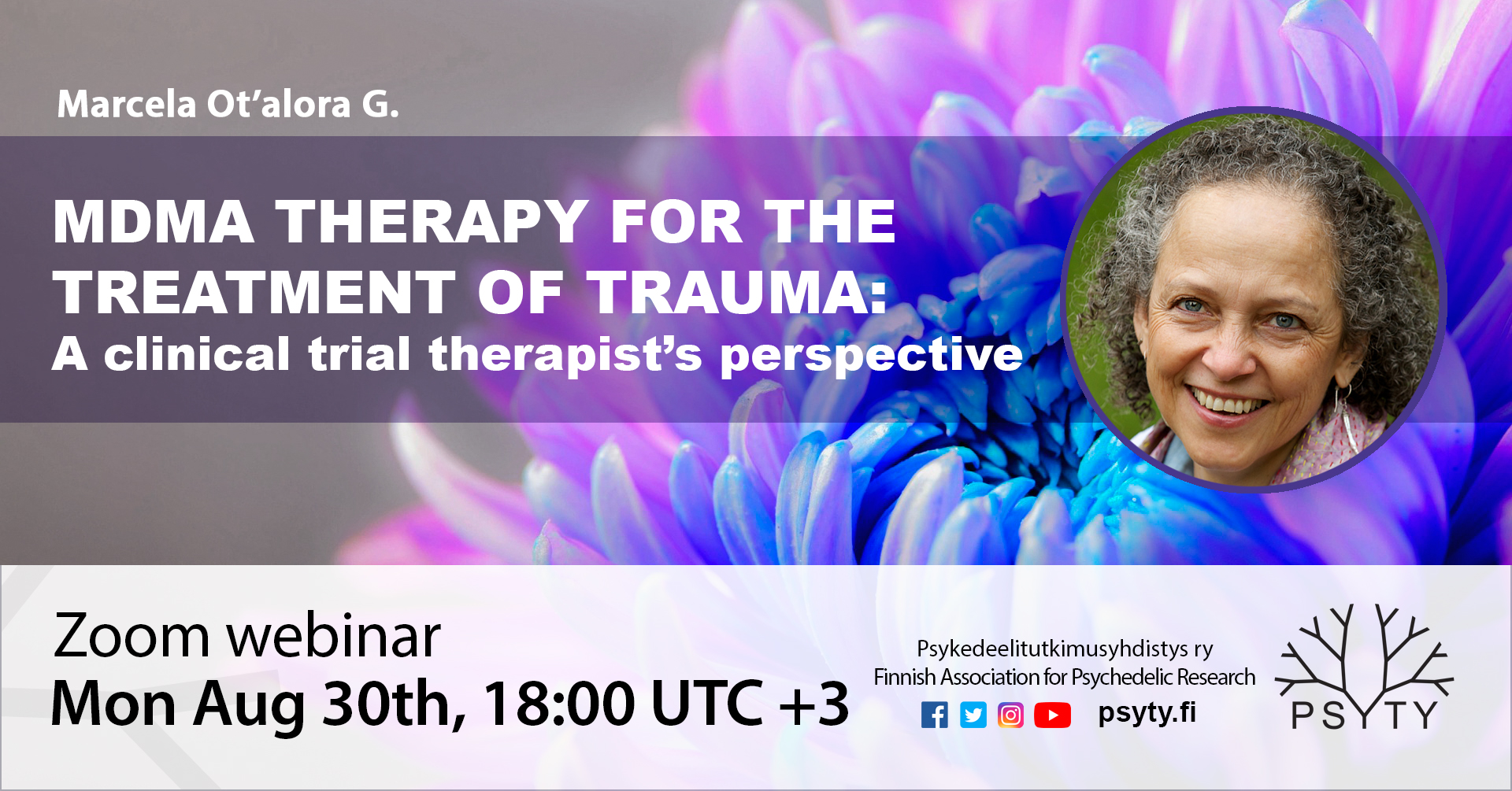
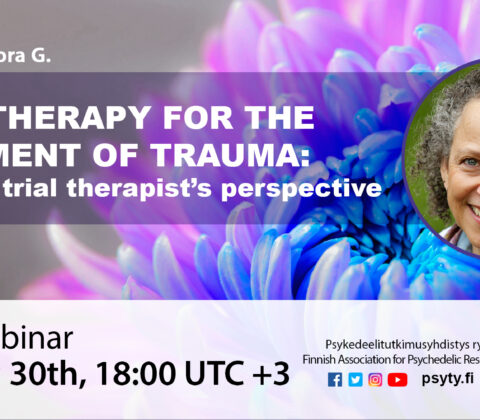
Zoom webinar Aug 30th 2021. MDMA therapy for the treatment of trauma: A clinical trial therapist’s perspective

MDMA-assisted psychotherapy has received a lot of attention in the treatment of post-traumatic stress disorder (PTSD), but what exactly happens in an MDMA therapy session? Why is working with PTSD challenging, and how might MDMA help? What is the “inner-directed” approach utilized in clinical trials of MDMA-assisted therapy?
On Monday, August 30th 6PM UTC+3, the Finnish Association for Psychedelic Research presents a Zoom webinar with Marcela Ot’alora G, principal Investigator, trainer, and therapist for studies investigating the safety and efficacy of MDMA-assisted therapy for the treatment of PTSD. Based on her extensive experience, the session includes a presentation and discussion with questions from the audience.
Marcela Ot’alora was born and raised in Colombia, and currently lives in Boulder, Colorado. She has an MA in Transpersonal Psychology from Naropa University in Boulder, Colorado, and an MFA from the University of North Carolina at Greensboro. Marcela started her career as an installation artist and teacher, using art as a vehicle for self-expression and processing trauma with underrepresented communities. For over 20 years, she’s been in private practice working primarily with PTSD. Her interest and focus on trauma led her to understand the healing journey as an intimate re-connection with one’s innate essence through love, integrity, acceptance, and honoring of the human spirit. In addition to working with trauma and PTSD, she has dedicated her professional life to training and research. She has worked on various studies sponsored by the Multidisciplinary Association for Psychedelic Studies (MAPS) as Principal Investigator and therapist using MDMA-assisted psychotherapy for the treatment of PTSD. Additionally, she is a lead trainer and supervisor.
Tickets are available in two categories: 10 € (full price) and 5 € (students / low income participants) in our web store:
For members of the association who’ve paid their membership fee for 2021, the event is free of charge. If you want to buy a membership, you’ll find our membership items in our web store: https://holvi.com/shop/psyty. An email with a link for free registration has been sent to members of the association.
